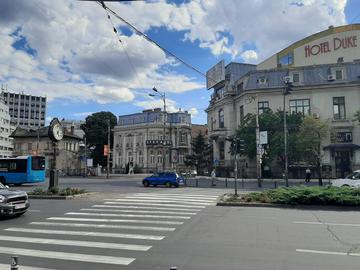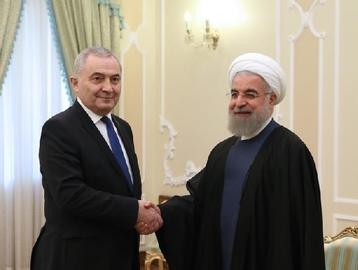Today the Bucharest police homicide department continues its investigation into the death of Gholamreza Mansouri, the former judge who was found dead in a Bucharest hotel on the afternoon of Friday, June 19. As part of suspicions surrounding Mansouri’s death, questions have arisen about possible political bias in the investigation, as both Romanian authorities and the Iranian foreign ministry immediately assumed Mansouri committed suicide. Is Romania’s judiciary truly independent or could it be prone to cave into political pressure? Does Romania have a history of assassinations of foreign dignitaries? And just how fair is Romania’s justice system?
“These kinds of accidental deaths of foreign dignitaries, they are not a domestic type of assassination, not related to the Romanian political system as such,” political scientist Silvia Marton told IranWire.
Prior to 1989, Romanian authorities prevented at least two murder attempts on Israeli citizens in the country. “If Romania indeed has some criminal networks or gangs operating, Romanian intelligence services would try to stop them as they have done in the past,” Eliza Gheorghe, Assistant Professor of International Relations at Bilkent University in Ankara, Turkey, said.
“In general physical violence in Romania is rather limited, which explains the lack of political violence,” explained Marton, professor at the University of Bucharest. “In Bulgaria and former Yugoslavia political killings are more frequent. Romania’s political system is somewhat stable. Political parties behave like cartels. Elections guarantee that parties can regain their cartel. There is no insurgence or movement from outside the main political parties that challenge them seriously or violently. A cartel-like political system dilutes political opposition.”
The Case of Mohammed Ali Assadi
Judge Mansouri is not the first prominent Iranian citizen to die in Romania since the fall of communism. In November 1994, Mohammed Ali Assadi, an alleged monarchist opposition leader, was assassinated here after having applied for asylum in the United States. At the time, Romanian police claimed Assadi had been involved in “illicit business” and said he was killed by rival Iranian criminals in Romania. The Iranian Embassy in Bucharest at the time also alleged that Assadi was a criminal and that his murder was not political. Yet at the time Romanian newspaper Evenimentul Zilei reported that the victim had accompanied a nephew of the former Shah while he was visiting Romania, although Iranian opposition groups in London told the Reuters press agency that they had never heard of Assadi. Romanian police reportedly arrested three Iranian suspects. But the case was never solved.
In the aftermath of Romania’s violent revolution of December 1989, in which long-time communist dictator Nicolai Ceaușescu was executed after a short impromptu trial, security services were still very influential and entangled in the emerging capitalist economy and politics alike. “General A.,” director of the Interior Ministry’s Foreigner and Passport section, died in a mysterious car accident in 1995, after which his bodyguard went on to make a career in European hypermarkets. A few years before, Romanian-born professor Ioan Culiani was killed execution-style in broad daylight on the campus of the University of Chicago. Culianu, an internationally renowned scholar of the history of religion and an outspoken skeptic of Romania’s revolution, had received threats. The case was never solved.
“In those days of transition from communism, Romania was still a non-aligned country with ties to countries like Iran,” says political scientist Marton. The first capitalists of the new free economy were in fact related to Romanian communist policies and conducted business with similar non-aligned states with approval of the Securitate, Romania’s infamous secret service. The first big fortunes were made using these networks. In the early 1990s Romania was a smuggling paradise and organized crime flourished.
In the 1990s miners were called upon to settle political disputes, but this was an exception according to Professor Marton. Since those early days of the post-communist era Romania has transformed into a full-fledged democracy. It joined the NATO security alliance in 2004, which has resulted, among other things, in better civil-military relations. Romania also became a member of the European Union in 2007. Among membership requirements were guarantees concerning the rule of law, including independence of the judiciary.
Yet Romania does have its fair share of corruption, which affects the functioning of law enforcement to some extent. Last year the country was shaken up by the abduction and murder of two teenagers in Caracal, an impoverished city of 31,000, 175 kilometers southwest of the capital. As details about the cases emerged in the media, high-level police officials were accused of incompetence and of working alongside people that should have been arrested for extortion and kidnapping. Whatever the connections were between police, criminals and politicians, the Caracal murders resulted in the downfall of the social democratic PSD government, in power since the general elections of December 2016. If there are links between politicians and criminal gangs and networks, they appear to be of the small-town variety.
Steps to Tackle Corruption
Despite Romania’s relatively poor ranking in Transparency International’s Corruption Perceptions Index (70 out of 180), its criminal justice system is generally considered fair and just. The populist PSD tried to use its parliamentary majority to undermine the rule of law, not inspired by illiberal governments in Hungary and Poland, but in order to prevent prosecution and detention of its corrupt politicians. However, it was not successful, as the judiciary rejected most of the legislation that challenged its independence. The leader of PSD, Liviu Dragnea, was convicted to a three-and-half year prison sentence in May 2019 for influence-peddling and graft.
Romania’s National Anticorruption Directorate (DNA), operating since 2013, has convicted mayors, judges and MPs of political corruption, including the above-mentioned Dragnea. Former DNA chief prosecutor Laura Codruța Kövesi, described by the Guardian as a “quiet, unassuming chief prosecutor who is bringing in the scalps,” has been very effective in tackling political corruption. As a result she was recently appointed as the first European Union Public Prosecutor.
Will the relationship between Iran and Romania influence the outcome of the investigation into Mansouri’s death? Bucharest’s relations with Tehran have been minimized but maintained since Romania left the Warsaw Pact, abandoned its permanent guest status vis-à-vis the Non-Aligned Movement, and joined the Western alliance in the 1990s. “Even after 1989 Romania maintained an open door toward Iran,” Professor Gheorghe told IranWire. As part of the NATO partnership, ballistic missiles in Romania are pointed at Iran. “But I don’t see Romanians not sleeping at night because of Iran, and vice versa,” she says. “Officials in Iran generally have a positive image of Romania.”
“This story shows that if we [Romanians] were going to deliver this high-ranking cleric to Iran, relations are normal enough between the two countries,” says Eliza Gheorghe from Bilkent University.
So far, President Klaus Iohannis and Prime Minister Ludovic Orban have been silent on the case.
Be that as it may, Romania’s criminal judicial system has a long reputation of being independent. Complex investigations into crimes against humanity during the 1989 revolution and its aftermath are still ongoing despite political backlash and resistance in society.
Will the police investigation into the death of judge Gholamreza Mansouri be independent and free from political interference, from either inside or outside Romania? Chances are it will be. In fact, it was the judiciary’s decision that prevented Mansouri from being extradited to Iran after he was arrested upon his arrival in Romania, despite an Interpol arrest warrant and pressure from Tehran.


























comments